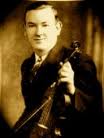Annotation:Maid of Mount Kisco (The)
X:1 T:Maid of Mount Kisco, The M:C| L:1/8 R:Reel K:Ador AG|EA (3AAA BGAG|EA (3AAA BGAG|EG (3GGG BGAG|EG (3GGG EG D2| EA (3AAA BGAG|EA (3AAA BABd|edef ~g3e|1 dBGB A2 AG:|2 dBGB A2 z2|| |:A3B dBAB|G2 BG EG B2|A3B d2 (3Bcd|1 efge dBGB:|2 efge d2 (3Bcd|| |:ea (3aaa bgag|{a}gedB GA (3Bcd|ea (3aaa bgag|{a}gede ~g3 z| a3e ~g3e|dedB GA (3Bcd|eA (3AAA efge|1 dBGB A2 (3Bcd:|2 dBGB A2 z2||
MAID OF MOUNT KISCO (Gearrchaile Shliabh Cisco). Irish, Reel. A Dorian. Standard tuning (fiddle). AABCC (Harker/Rafferty, Tubridy): AA'BCC: AA'BCC' (O'Malley): AA'BB'CC' (Alewine).

County Sligo fiddler Biography: Paddy Killoran [1] was, according to renowned Galway and New York flute player Jack Coen (who knew him well), the composer of the popular session tune "The Maid of Mt. Kisco" (info from Don Meade). Button accordionist Jim Coogan, who knew both parties, related that Killoran named the tune for his friend Ann Mulligan of Mt. Kisco, a suburban town of approximately 10,000 souls in Westchester County, north of New York City. Other stories about the tune's name and origin abound but can probably be regarded as apocryphal.
Killoran recorded "The Maid" for Decca Records in 1937, the earliest found instance of a sound recording of the melody. Philippe Varlet finds subsequent versions by another Decca Irish artist, Joe Maguire (1945), Leo Rowsome (London, 1947), and the Kincora Céilí Band, led by Kathleen Harrington (Dublin, 1952). Two relatively early versions can be found by older groups on the RTE compilation video "Come West Along The Road". The title is sometimes irritatingly misspelled "Mt. Cisco" perhaps from its appearance in Brendan Breathnach's Ceol Rince na hÉireann, in which Kisco is spelled Cisco because in the Irish language there is no letter 'K'. In Ireland the name is pronounced like that of the "Cisco Kid," although name of the Westchester town in pronounced with a hard 'K'. The earliest printed version appears to be from button-accordion player Jerry O'Brien's collection published in Boston around the year 1950.
The note that accompanies Leo Rowsome's recording at the Internet Archive [2] gives: "Killoran played it very much as a fiddler might, with a prominent bowed triplet in the first bar; flute players and pipers like Leo very quickly substituted more standard rolls, and a different rhythmic emphasis, resulting in the setting you hear here" (Rowsome's recording can be heard on the link below).

